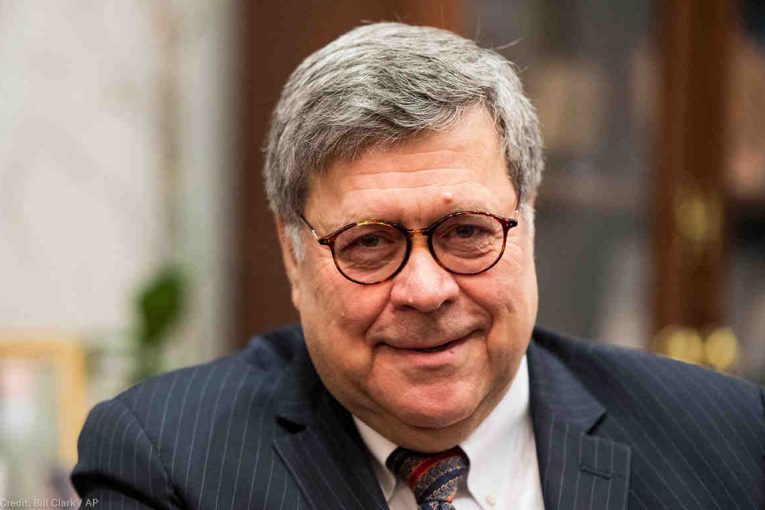

by David Greenwald
Justice Department officials have drafted a potential new law that would delay, perhaps indefinitely, court hearings and extend speedy trial provisions and statutes of limitation—which has led to the concern of many civil liberties advocates that, during this time of national crisis surrounding the coronavirus, the US DOJ is seeking the authority to erode traditional civil liberties protection.
This, some fear, could allow judges to detain people indefinitely without trial during emergencies.
Some of the proposed language would put the authority to make this decision in the hands of the Attorney General or his designee, along with the chief judge of a court.
The language here reads: “Upon application of the Attorney General or the Attorney General’s designee or on his own motion, the chief judge of a court of appeals that has been affected or that includes any trial court of the United States so affected…”
It continues, saying they “may, in the event of a natural disaster, civil disobedience, or other emergency situation requiring the full or partial closure of courts or other circumstances inhibiting the ability of litigants to comply with deadlines imposed by statutes or by the rules of procedure applicable in the courts of the United States, enter such order or orders as may be appropriate to delay, toll, or otherwise grant relief from time deadlines imposed by otherwise applicable statutes and rules of procedure for such period…”
As Politico first reported last week, “The move has tapped into a broader fear among civil liberties advocates and Donald Trump’s critics — that the president will use a moment of crisis to push  for controversial policy changes.”
for controversial policy changes.”
Of course, as Politico notes, the DOJ requests “are unlikely to make it through a Democratic-led House.”
But they are fairly broad, encompassing several stages of the legal process including initial arrest, processing of cases, statutes of limitation, and investigation.
Under one proposal, the AG would have the power to ask a judge of any district court to pause court proceedings “whenever the district court is fully or partially closed by virtue of any natural disaster, civil disobedience, or other emergency situation.”
The language calls for: “[S]etting new time limits under this section for criminal cases and civil enforcement actions brought by the government.” That would de facto suspend normally speedy trial provisions that give defendants the right to have preliminary hearings and trials within a statutory period of time.
Under this proposal, “the court shall consider the government’s ability to investigate, litigate and process defendants during and beyond the emergency situation.”
As it explains, the new section “would make clear that, in setting new time limits applicable in criminal cases, the court must consider the government’s ability to investigate, litigate and process defendants during and beyond the emergency situation.”
For some that sounds a lot like indefinite detention.
The measure would also “suspend the statute of limitations for all federal offenses during a period of nationwide emergency if the Chief Justice determines that the emergency will materially affect the functioning of the federal courts. “
As they explain, this “would provide for automatic exclusions of time under the Speedy Trial Act for any period of delay attributable to a national emergency that results in a suspension of statutes of limitations…”
The proposal has spread alarms in the civil liberties community.
“This doesn’t help anything. There is nothing that this [proposed] law does to make us safer. What it allows for is a sweeping suspension of critical rights for people in the criminal legal system,” said Jeffery Robinson, director of the American Civil Liberties Union’s Trone Center for Justice and Equality. “I think this is a transparent attempt to grab power and make it easier for the government to wield its authority.”
“Not only would it be a violation of that, but it says ‘affecting pre-arrest,’” said Norman L. Reimer, executive director of the National Association of Criminal Defense Lawyers. “So that means you could be arrested and never brought before a judge until they decide that the emergency or the civil disobedience is over. I find it absolutely terrifying. Especially in a time of emergency, we should be very careful about granting new powers to the government.
“That is something that should not happen in a democracy,” he said.
Kerri Kupec, a Justice Department spokesperson explained on Twitter that these proposals were were meant to “harmonize what is already being done on an ad hoc basis by courts around the country.
“Because of pandemic-related measures, courts are closing and grand juries are not meeting. That means prosecutors may not be able to indict criminals before a statute of limitations expires, or dangerous criminals who have been arrested may be released because of time limits,” Kupec said, adding, “Criminals should not be able to avoid justice because of a public-health emergency.”
Many local law enforcement officials have adjusted to the crisis by limiting or altogether ceasing the arrest and prosecution of low-level offenders, while the Justice Department has resisted such measures.
Jeffery Robinson of the ACLU said this week that the only “sane way” for law enforcement to address the crisis was “to get as many people out of jail as possible.”
—David M. Greenwald reporting
To sign up for our new newsletter – Everyday Injustice – https://tinyurl.com/yyultcf9

